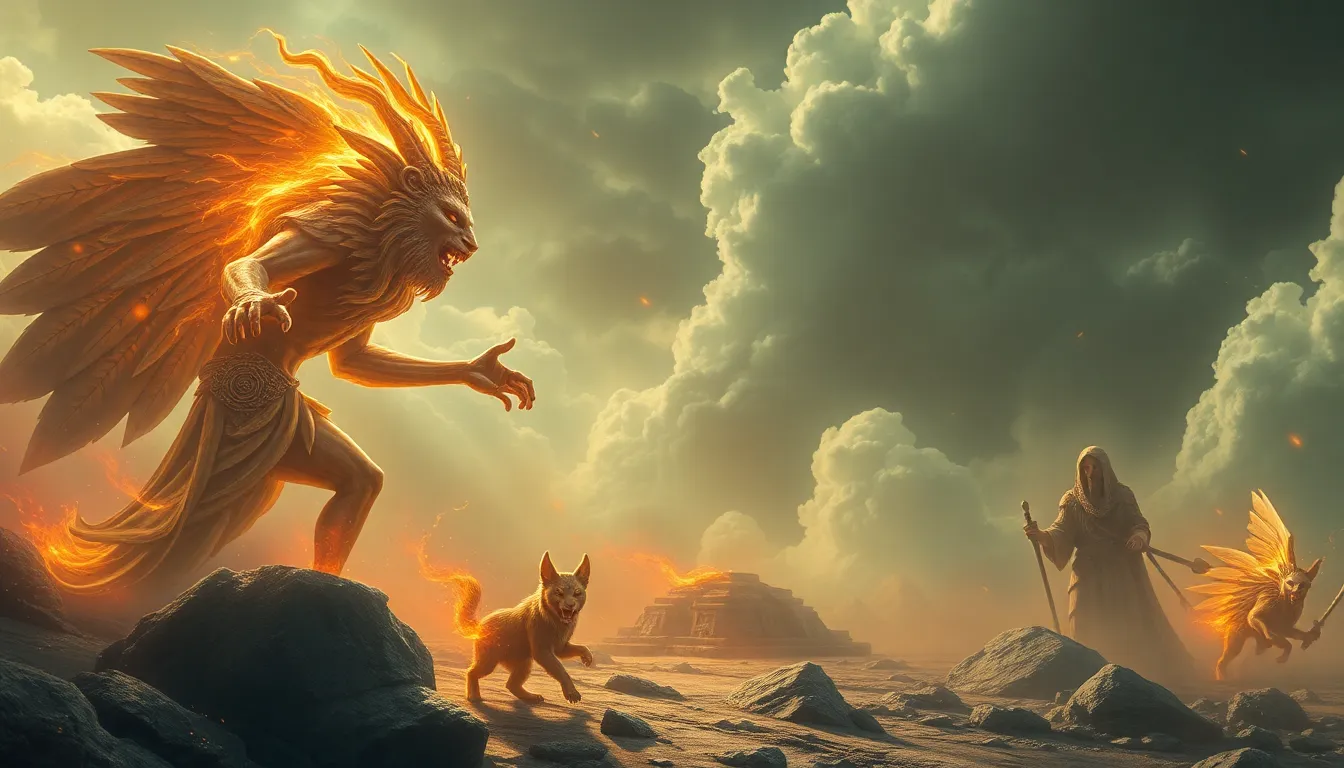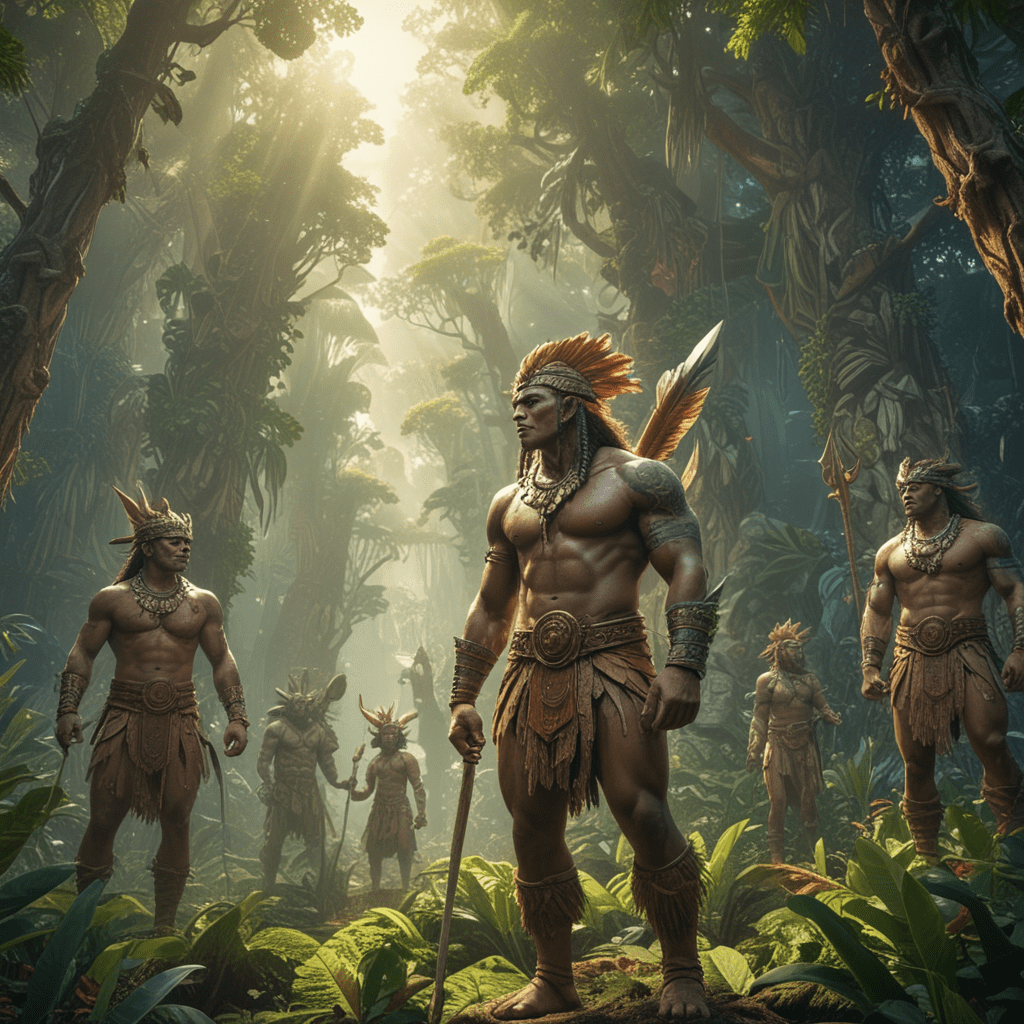The Most Captivating Myths of Ancient Deities and Their Adventures
I. Introduction to Ancient Deities
Ancient deities have long been the focal point of human fascination, representing the supernatural forces that shape our world and beliefs. These gods and goddesses were not merely figments of imagination; they embodied the values, fears, and aspirations of the civilizations that worshipped them. Through their stories, ancient deities provided explanations for natural phenomena, moral guidance, and reflections of human nature.
Myths play a crucial role in understanding the cultures and beliefs of ancient societies. They serve as a window into the values and perspectives of different peoples, illustrating how they perceived the divine and its influence on daily life. This article delves into some of the most captivating myths surrounding ancient deities, exploring their adventures and the lessons they imparted across various civilizations.
II. The Pantheon of Ancient Civilizations
Throughout history, major ancient civilizations have developed rich pantheons of gods and goddesses. These deities were often interconnected, sharing similar traits and stories, even across different cultures. Some of the most notable civilizations include:
- Greek Civilization: Home to gods like Zeus, Hera, and Athena.
- Roman Civilization: Adapted many Greek deities, such as Jupiter (Zeus) and Venus (Aphrodite).
- Egyptian Civilization: Featured gods like Ra, Isis, and Osiris.
- Norse Civilization: Included deities such as Odin, Thor, and Freyja.
The interconnectedness of myths across cultures is evident in their themes and archetypes. For instance, the hero’s journey is a common narrative found in Greek, Norse, and even Egyptian myths, illustrating universal human experiences and struggles.
III. The Creation Myths: Origins of the Universe
Creation myths serve as foundational stories that explain how the universe and humanity came into being. Different civilizations have their own unique narratives:
A. Greek Creation Myths: Chaos to Cosmos
In Greek mythology, the universe began with Chaos, a primordial void. From Chaos emerged Gaea (Earth), Tartarus (the abyss), and Eros (love). Gaea birthed Uranus (the sky), and together they created the Titans, who played crucial roles in the unfolding of divine history.
B. Egyptian Creation: The Emergence of Ra and the Nile
The ancient Egyptians believed that the universe originated from a watery chaos called Nun. From this chaos, the sun god Ra emerged, bringing light and order. Ra’s journey across the sky each day symbolized the cycle of life and death, closely tied to the annual flooding of the Nile, which nourished the land and sustained life.
C. Norse Creation: Yggdrasil and the Nine Realms
Norse mythology describes the creation of the world from the body of the slain giant Ymir. His flesh became the earth, his blood the seas, and his bones the mountains. Central to this mythology is Yggdrasil, the World Tree, which connects the Nine Realms, including Asgard (the realm of the gods) and Midgard (the realm of humans).
IV. Love and Betrayal: The Epic Tales of Romance
Love and betrayal are central themes in many myths, often leading to epic tales of passion and conflict.
A. Aphrodite and Ares: Love Amidst War in Greek Mythology
Aphrodite, the goddess of love, was famously involved with Ares, the god of war. Their affair, however, was fraught with challenges, especially from Hephaestus, Aphrodite’s husband. This love story highlights the dichotomy between love and conflict, with both deities representing powerful yet conflicting forces in human life.
B. Isis and Osiris: The Enduring Love Story of Egyptian Gods
In Egyptian mythology, the love between Isis and Osiris is legendary. After Osiris was murdered by his brother Set, Isis embarked on a perilous journey to find and resurrect him. This myth emphasizes themes of loyalty, love, and the triumph of life over death, resonating deeply within the Egyptian belief system.
C. Freyja and Her Suitors: Norse Tales of Love and Rivalry
Freyja, the Norse goddess of love and fertility, had many suitors vying for her affection. Among them was the god of mischief, Loki, who often created chaos in Freyja’s romantic pursuits. Her stories reflect the complexities of love, rivalry, and the challenges faced in relationships.
V. Heroic Quests and Epic Battles
Many myths revolve around heroic quests and epic battles, showcasing the strengths and vulnerabilities of both gods and mortals.
A. The Twelve Labors of Heracles: Trials and Triumphs
Heracles, one of the most famous Greek heroes, was tasked with completing twelve labors as penance. Each labor presented unique challenges, from slaying the Nemean Lion to capturing the Golden Hind. These trials illustrate themes of perseverance, strength, and redemption.
B. Thor and the Midgard Serpent: A Battle for the Ages
In Norse mythology, Thor’s battle with the Midgard Serpent (Jörmungandr) is a significant event foretold in Ragnarok, the end of the world. This epic confrontation symbolizes the struggle between order and chaos, showcasing Thor’s bravery and strength against overwhelming odds.
C. The Trojan War: Deity Involvement and Human Destinies
The Trojan War, a pivotal event in Greek mythology, involved numerous gods and goddesses who took sides, influencing the fate of the human warriors. This myth highlights the intricate relationship between the divine and mortal realms, showcasing how the whims of deities could alter the course of human history.
VI. Tricksters and Transformations: The Role of Mischief
Tricksters are often pivotal characters in mythology, representing chaos and transformation.
A. Loki in Norse Mythology: Chaos and Cunning
Loki, the Norse god of mischief, is notorious for his cunning and unpredictable behavior. His actions often led to significant consequences, both for the gods and for himself, illustrating the duality of chaos and order.
B. Hermes in Greek Mythology: The Messenger God’s Adventures
Hermes, the Greek messenger god, was known for his speed and cunning. He played a crucial role in many myths, often assisting heroes while also engaging in trickery, showcasing the complexity of his character.
C. Anansi the Spider: Trickster Tales from African Folklore
Anansi, a spider god in West African folklore, is a beloved trickster figure known for his cleverness and ability to outsmart others. His tales often convey moral lessons, highlighting the value of intelligence and wit over brute strength.
VII. The Afterlife: Myths of Death and Rebirth
Beliefs about the afterlife vary greatly across different cultures, with each mythology providing insights into how ancient peoples viewed death and rebirth.
A. The Egyptian Book of the Dead: Judgement and the Afterlife
The Egyptian Book of the Dead outlines the journey of the soul after death, detailing the judgment process wherein the heart is weighed against the feather of Ma’at. This judgment determined one’s fate in the afterlife, emphasizing the importance of living a virtuous life.
B. Greek Views on the Underworld: Hades and Persephone
In Greek mythology, Hades ruled the Underworld, where souls resided after death. The tale of Hades and Persephone illustrates the cyclical nature of life and death, with Persephone’s annual return to the surface symbolizing the changing seasons.
C. Norse Beliefs in Valhalla and Hel: Honor in the Afterlife
Norse beliefs regarding the afterlife included Valhalla, a majestic hall for warriors who died in battle, and Hel, a realm for those who did not die heroically. These beliefs reflected the values of honor and bravery, showcasing how individuals could achieve a form of immortality through their deeds.
VIII. Nature and the Elements: Deities of Earth and Sky
Many ancient deities personified natural forces, embodying the earth and sky and highlighting humanity’s connection to the natural world.
A. Gaia and Uranus: The Personification of Earth and Sky in Greek Myths
Gaia, the Earth goddess, and Uranus, the sky god, symbolize the union of land and sky. Their offspring, the Titans, represent various aspects of nature, illustrating the Greeks’ deep reverence for the natural elements.
<h



